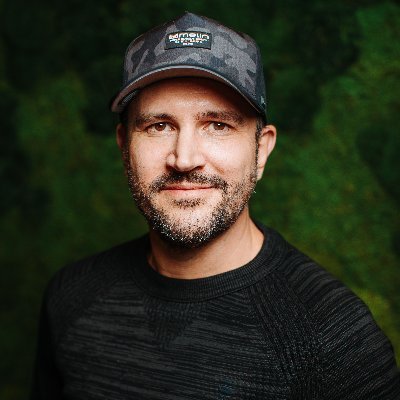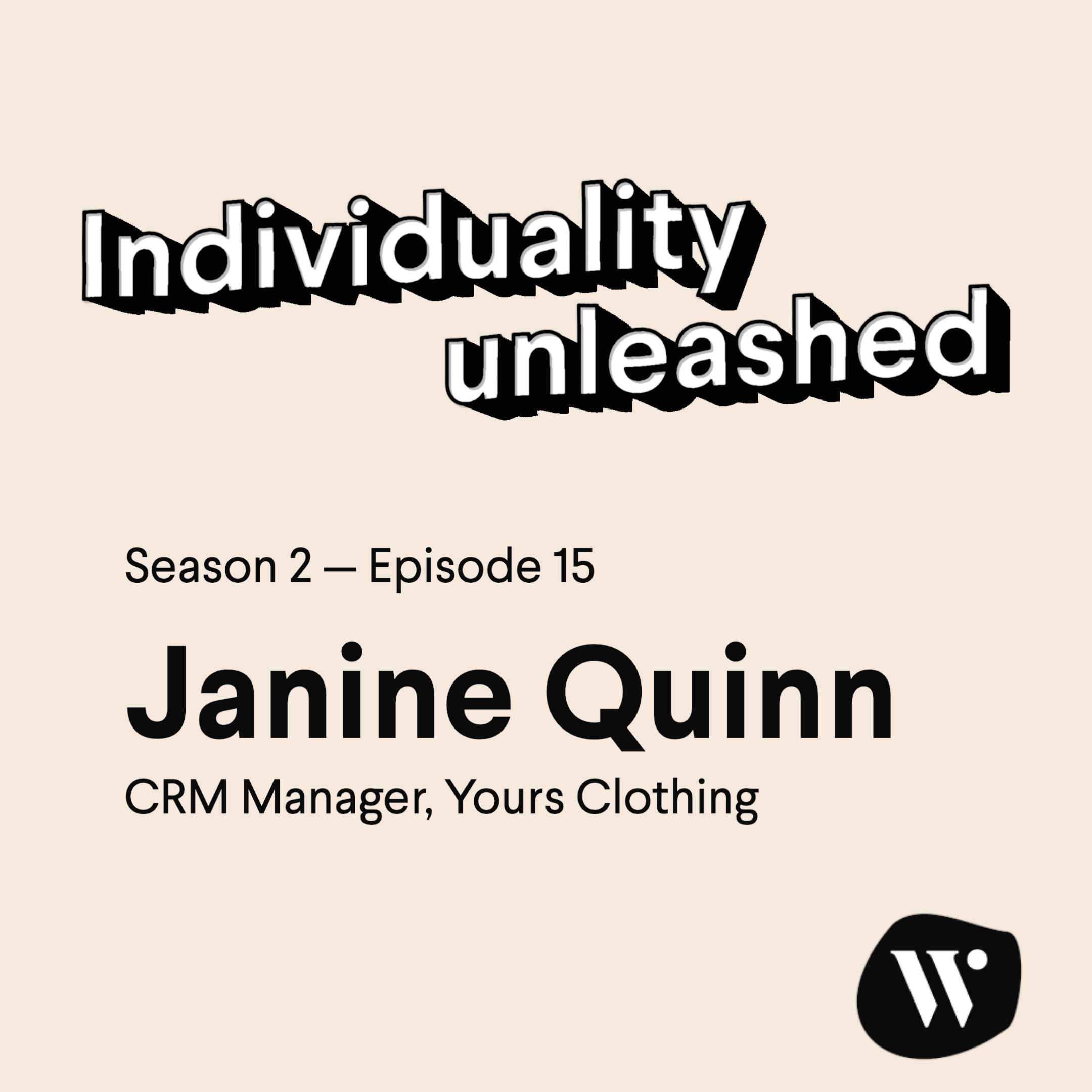Live From Wunder! Growth of D2C in Traditional Brands
- 0.5
- 1
- 1.25
- 1.5
- 1.75
- 2
Speaker 1: Three, two, one, go.
Vern Tremble: Welcome to Individuality Unleashed. I'm Vern Tremble, senior director of marketing at Wunderkind, and I'm joined today with Richard Jones to have a really great conversation about D2C brands.
Richard Jones: Great to be here, Vern. Great to be here.
Vern Tremble: We are here in beautiful Santa Fe, New Mexico. The altitude, we're at what? 7, 000 feet above sea level. Tough to breathe, but I'm trying.
Richard Jones: It is easy to breathe if you've been in Colorado for five- and- a- half years like me.
Vern Tremble: I have not. So if I end up on the floor, please try to... No. You know what? Don't try to resuscitate me. I'll be fine on the floor.
Richard Jones: I'll try my best.
Vern Tremble: Well, guys, today we're going to be talking about D2C brands, traditional versus digital brands. We're going to talk about the evolution of D2C brands, what they've gone through, some of the strategies that they've had to deploy over the years in order to sustain themselves during the pandemic, and now with the impending challenges that we're facing with recession. So, we really want to just dive into this topic. It's really important. We know, Rich, you're a wealth of knowledge, and we want to just get your take on this topic to really help our listeners and viewers out there understand how they could deploy some of these strategies to empower themselves as D2C brands themselves.
Richard Jones: Let's do it. Let's dig in.
Vern Tremble: Great. Great. So, let's start with this. So a few years ago, D2C brands were technically the disruptors.
Richard Jones: Right.
Vern Tremble: They essentially figured out the playbook by understanding what gap there was in the market, understanding how to position and market a new product that wasn't available before, cutting out the middleman essentially and selling direct to consumers. Which was unthinkable at the time, and it was certainly a strategy that e- commerce brands used a lot of. But now, you have a lot of traditional brands that are using that same strategy. With this new playbook in place, is this strategy still relevant as we think about how brands are maturing and handling the changing landscape in marketing today?
Richard Jones: I mean, it's relevant, but the playbook will only take you so far. I mean, most of the big brands are now getting in on the action, and the disruptors are becoming the disrupted. So, it's interesting to look at what's going on.
Vern Tremble: So, what do you mean by that exactly?
Richard Jones: Well, look, we can split the D2C market into two camps. Digital natives and traditional brands. Digital natives emerged in 2010 or later, and started off selling their products directly to consumers through e- commerce channels, as we know. They were very clever at using super- targeted digital marketing campaigns to drive awareness and customer acquisition, and poaching market share away from bigger brands. We saw that in multiple different segments. Traditional brands definitely are the incumbents, but they are catching up fast because of this disruption, and increasingly adopting their own D2C strategies. More than 30% of the revenues at brands like Nike and adidas come from D2C sales right now, which is phenomenal considering where they were just a few years ago.
Vern Tremble: That is really amazing. So can you talk to us about how the D2C space is evolving, and how the two types of D2C businesses, the digital natives versus the traditional brands, are navigating these changes?
Richard Jones: Yeah. Well, overall, the D2C space is still seeing absolutely huge growth. In the US, D2C e- commerce sales have more than tripled in the past six years. According to a report by eMarketer, the D2C market has grown from around$ 36 billion in 2016 to $ 128 billion in 2021, which is an increase of almost 100 billion in just over half a decade. Now, the D2C market is expected to be worth just over$ 212 billion by the end of 2024.
Vern Tremble: Well, this is nuts. This is a big opportunity.
Richard Jones: Huge opportunity.
Vern Tremble: You have to be able to move to able to take advantage of this, though.
Richard Jones: Exactly. Exactly.
Vern Tremble: Now, so what do you think about growth? How is that differentiated?
Richard Jones: Yeah. Well, I mean, growth will be different for the two camps for sure. We expect to see D2C e- commerce sales of traditional brands increase by about 22.6% in 2022, whereas digital natives will grow by 17.5%. Basically, established brands are beating digital natives at their own game at the moment, and they now account for nearly three- quarters of the US D2C e- commerce market.
Vern Tremble: So, the disruptors really have been disrupted.
Richard Jones: At the moment, that's the way it's looking inaudible.
Vern Tremble: So, tell me about the market conditions right now. What do you see?
Richard Jones: Well, the market conditions are tough for almost everybody, as we all know, at the moment, and many disruptor D2C brands made headlines recently by laying off staff. Now, the figures forecasting growth sound promising, but with talks of recession and inflation that we covered on a recent podcast, consumers are becoming more cautious in how they spend their money, and D2C brands are feeling the pinch too. But D2C is a great opportunity, especially in a recession, and especially if you already have a strong brand and loyal customers.
Vern Tremble: You mentioned how brands like Nike... We say Nike in The States.
Richard Jones: Nike. We invented the English language.
Vern Tremble: That's true. And adidas, adidas, are doubling down on D2C now. Why is D2C such a great opportunity for large companies, and how are they leveraging it?
Richard Jones: Well, D2C revenues drive higher margins. I mean, which is a key reason why brands are focusing more on D2C now. That's big, traditional brands. In fact, Nike said it's direct- to- consumer sales helped compensate for the decline in its wholesale business early- on in the pandemic. So a massive, massive benefit. Now, Nike and other big companies like Tesla are experiencing much faster growth, about 23% this year, in D2C e- commerce sales compared to disruptors. This has a knock- on effect on other businesses in other ecosystems. For example, in February, Foot Locker's stock dropped by 35% after Nike announced it would focus more on D2D.
Vern Tremble: So although not really first- mover advantage, it kind of was for these traditional brands.
Richard Jones: Exactly.
Vern Tremble: Yeah.
Richard Jones: Exactly. Yeah. Now, on the flip- side of the coin, digital natives are now reaching maturity, and they are at a place where they need to explore more traditional strategies for growth if they want to still scale. Now, without the built- in scale of mass retailers, they need to work harder to drive awareness and sales. Now, there used to be an expression, " CAC is the new rent." Now, D2C brands realizing the value of bricks- and- mortar. That's probably why the D2C cosmetics brand Glossier, Glossier recently partnered up with Sephora to sell its products in stores. And we're seeing more and more of those kind of relationships happen across the industry.
Vern Tremble: Yeah. Really, it's an understatement to say that this is super- interesting. It's just amazing to see this landscape and this transformation happen. What kind of growth strategies should D2C companies be looking at and deploying right now?
Richard Jones: Yeah. Well, the traditional playbook for D2C was very much based on using digital advertising. So mainly search, social media, and influencer marketing to reach highly- targeted audiences. Now, D2C brands were great at using data to measure and optimize their campaigns. Even today, Facebook and Instagram are the top acquisition channels for the majority of D2C brands. But this approach is becoming less and less effective. Apple and Google, among others, have responded to consumer privacy concerns in their data privacy legislation. Apple's app- tracking transparency, the ATT initiative, and Google announcing the end of third- party cookie tracking makes it harder for D2C brands to track the performance of their online ads. At the same time, acquisition costs for social media advertising are rising fast. So basically, brands are getting less and less bang for their buck following that traditional D2C playbook.
Vern Tremble: Yeah. So using the old playbook will cost you more, less visibility, less clarity as to how you're driving revenue and driving success. So what does that mean for D2C brands?
Richard Jones: Well, and it means that D2C brands will need to leverage their own channels. Right?
Vern Tremble: Yeah.
Richard Jones: That's going to be the differentiator. Particularly email and text, especially in an economic downturn. Blowing through your budget with online ads that show dwindling returns, it just isn't sustainable in an economy as tough as this. That's where Wunderkind can actually help. So if you're spending money on sending traffic to your site, then you need to have a strategy in place to identify that traffic and to re- market to them. Ideally, via your own channels. Not spending even more money on ads. So D2C brands use Wunderkind to identify and engage with their site visitors, turning anonymous website traffic into real customers who make real sales.
Vern Tremble: I mean, this means a lot though. Being able to deploy a strategy like that ultimately helps drive and gives marketers the ability to drive customized one- to- one messaging to people that want to feel like individuals.
Richard Jones: Yeah. A hundred percent.
Vern Tremble: Yeah.
Richard Jones: Customers these days, they expect one- to- one communication, and tailored experiences, and privacy. Right?
Vern Tremble: Right.
Richard Jones: That's really hard to triangulate. Now, Wunderkind actually makes that a reality through email, text, identity, and the brand's website, alongside any of their existing MarTech platforms. Now, how we do it. Wunderkind is a performance marketing channel at its core. It drives between 11 to 15% additional e- commerce revenue. Wunderkind's technology actually helps brands convert customers through the channels that they own at- scale that wouldn't otherwise be possible, and even rivals paid media. In fact, in many of our customers, you can sort of rank where Wunderkind performs as a proportion of their digital revenue based on last- click attribution alongside all of your traditional channels like Facebook, Google, and others.
Vern Tremble: Yeah. So it sounds like own- channel marketing, whether you're a traditional or a digital D2C brand, is going to be what kind of sustains you through the challenging times that are coming up.
Richard Jones: Yeah. I think in many ways it's about making efficiency gains on the poorest- performing segment of your advertising, and making that efficiency gain through putting a little bit of budget away for folks like Wunderkind, who actually make the traffic that you're driving to your own channels perform that much better and actually end up in revenue. That's really the secret sauce.
Vern Tremble: That's awesome. That takes a big shift though, on your strategy. I know we're-
Richard Jones: Yeah, definitely. Look, I mean, you need to grow your opt- in lists to scale your email and text campaigns. That's absolutely key if you're going to make the most of your own channels. Wunderkind is the only channel- agnostic partner that can help you scale opt- ins and performance for text and email together, at the same time. Often, customers are using this in different, kind of siloed channels, and they're somewhat cannibalizing each other. Now, we basically wrote the playbook on how and when to ask for an opt-in on your website. All right? That's something that we pioneered. Combined with eMarketer's most advanced behavioral personalization technology, you get an undisruptive user experience that enables brands to quickly scale their email lists, which can help you drive online sales and customer loyalty in a sustainable way.
Vern Tremble: So sustainable growth is absolutely critical during this economic downturn, with these challenges that we're facing. And it's critical that you leverage a technology like Wunderkind, which is essentially a performance marketing channel that gives you that ability to understand, attribute that success, drive revenue that you may not have been able to see before because you just-
Richard Jones: Couldn't identify the people.
Vern Tremble: Couldn't do it. You couldn't do it. And now, to be able to use that to be able to understand what your strategy is and what success could mean in the future. Another thing that we're also noticing is that D2C brands may be even considering their reliance on social media channels as well, not only paid channels like Google and Facebook. So when it comes to measuring your business and marketing performance in a recession or market downturn, what kind of KPIs should D2C brands be looking at right now?
Richard Jones: Well, customer lifetime value is absolutely key. Right?
Vern Tremble: Yeah.
Richard Jones: So more and more thought leaders and retail investors are moving away from overly- simplified financial KPIs, and they're starting to develop new frameworks based on contribution margin and CLV, customer lifetime value. Now, the D2C space is experiencing somewhat of a wake- up call at the moment in this regard. Some brands have multi- billion- dollar valuations, but the rising costs of marketing and customer acquisition are making investors question profitability. Now, this is an issue that happens when leadership teams prioritize sales growth while neglecting profitability and CLV. CLV considers every unique customer's net value and future potential, taking into account the total cost of goods, fulfillment, and delivery from each transaction. I think D2C profitability will become more vital, and as margins get tighter, brands will need to set up and rethink how they measure success. Optimizing operational and marketing efficiency is what will separate the consumer brands of tomorrow from the D2C one- hit wonders that are out there.
Vern Tremble: That's phenomenal, Rich. This is so good. So to sum up, digital disruptors may have pioneered the D2C playbook, but big brands are catching up.
Richard Jones: Yeah. That's completely right. That's it. That's the takeaway here. And the new media value chain is a chance for traditional brands to cut the middleman out, to boost their own profit margins, and connect directly with their customers. Understandably, they're doubling- down on that opportunity. I mean, who wouldn't? We're seeing many, many brands do that. Now, the main challenge for smaller digital- native D2C brands right now is to manage the transition from disruptor to mature mainstream brands that can actually scale. And for both types of D2C business, driving sustainable growth is going to be absolutely key. Which is where Wunderkind, as a performance marketing channel, can help.
Vern Tremble: This is phenomenal, Rich. I think this is such a relevant topic. I think we did talk a lot about Wunderkind, but I think it's really important that we hit on what we do here at Wunderkind. We are a performance marketing channel. We are here to help our customers and other brands drive sustainable growth during what will be challenging economic times. So being able to do that with a performance marketing channel that you can guarantee an attributed revenue, that you can guarantee growth, it's just a no- brainer.
Richard Jones: A hundred percent.
Vern Tremble: It's a complete no- brainer. So one of the things that we want to do for our audience is to make sure that they realize that we're a source of information, and knowledge, and truth. That you can download tons of our content, whether it be a white paper, check out some of our impact stories. But also, go to our website and ask for a revenue estimate. Just, it's the quickest way.
Richard Jones: Exactly. I mean, the whole point of pioneering revenue as- a- service, which is right at the heart of what Wunderkind does, is that we are actually... Well, we'll talk to you, we'll understand your business a little bit more, and then we will make you a guarantee of a revenue increase that we're going to meet if you partner with us. So many software- as- a- service vendor out there will tell you, " Hey, buy my stuff. My software's great, and here's some services to implement it, and good luck."
Vern Tremble: Right.
Richard Jones: That's not what we do. It's revenue- as- a- service. We put our money where our mouth is, and we actually have contractual guarantees of minimum levels of revenue uplift.
Vern Tremble: I think that's phenomenal. I don't know of any other SaaS-
Richard Jones: I think all SaaS companies should do it, if they're bold enough to put their money where their mouth is.
Vern Tremble: You got to be bold to do it. And if you guys haven't heard, please check out episode number one that talks about revenue- as- a- service versus SaaS, software-as- a- service. Richard gives a great explanation of that. He really orients us around the space and really understanding what that concept is. Check it out. It's available now anywhere you find your podcasts. So Rich, phenomenal being in- person with you here in Santa Fe. It's absolutely gorgeous here. Thank you so much for taking time to chat with me today.
Richard Jones: No, Vern, it's been a pleasure as always.
Vern Tremble: Absolutely. Again, guys, thank you so much for tuning in. That's Individuality Unleashed.
Speaker 1: Three, two, one, go.
Vern Tremble: As always, Rich, an absolute pleasure sitting down, chatting with you here on this podcast that we hope is bringing tons of valuable insight to you at home, and listening in your car, or on podcast, or wherever you're listening to us. We hope... That was a mess. I'll try to bring it back together. No, I almost got out of it, but I was like, " Ahh."
Speaker 4: inaudible.
Vern Tremble: Rich.
DESCRIPTION
In this episode of Individuality Unleashed, we walk through the evolution of D2C brands, some of the strategic decisions they've deployed to sustain themselves during the pandemic, and how they plan to remain successful in the face of the impending recession.
Today's Host

Vern Tremble

Richard Jones
Today's Guests





